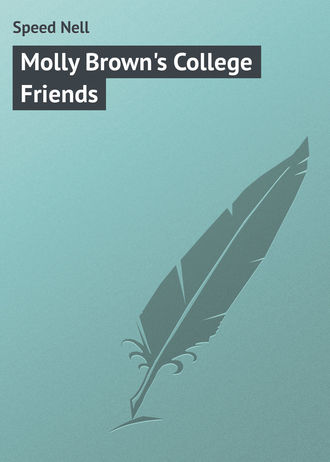 полная версия
полная версияMolly Brown's College Friends

Speed Nell
Molly Brown's College Friends
CHAPTER I
NANCE OLDHAM
“I am so afraid Nance will be changed,” sighed Molly as she put the finishing touches to the room her old friend was to occupy.
“I’ll wager anything she is the same old Nance Oldham,” insisted Professor Green, obediently mounting the ladder to hang the last snowy curtain at the broad, deep window in the guest chamber overlooking the campus. “I think she is the kind of girl who will always be the same. Is that straight?”
“A little bit lower at this end – there! What a comfort you are, Edwin!” and Molly viewed the effect approvingly.
“Pretty good general houseworker, eh?” and the dignified professor of English at Wellington College ran nimbly down the ladder and hugged his wife. She submitted with very good grace to his embraces in spite of the fact that the fresh bureau scarves and table covers with which she was preparing to decorate her old friend’s room were included in the demonstration of affection.
Professor Edwin Green always declared that he never expected to catch up on all the years he had loved Molly Brown and had been forced to let “concealment like a worm in the bud feed on his damask cheek.” He and Molly had been married almost four years on that day in March when he was assisting in the imposing rite of hanging curtains in the guest chamber, and she was still as wonderful to him as she had been on that day they had walked through the Forest of Fontainebleau and he had confessed his love. She was the same charming girl who had lingered too long in the cloisters and been locked in to be rescued by him on her first day at college, now so many years ago.
Indeed, Molly Brown has changed very little since last we saw her. Little Mildred is walking and talking and singing little tunes and saying Mother Goose rhymes. She even knows her letters upside down and no other way, having learned them from blocks, presumably standing on her curly head as she acquired the knowledge.
There is another baby in the nursery now: little Dodo, whose real name is George, a remarkably satisfactory infant who sleeps when he should and wakes in a good humor, taking the proper nourishment at the proper hours and going back to sleep. Molly had learned the great secret of young motherhood from her first born: not to take parenthood too solemnly and seriously, and to realize that Mother Nature is the very best mother of all and babies thrive most when left as much as possible to her all-wise and tender care.
Nance Oldham, Molly’s old friend and roommate at college, was coming at last to make her long promised visit to the Greens. Little wonder that Molly feared she would be changed! Nance’s path in life had not been strewn with roses. No doubt my readers will remember that Mrs. Oldham, her mother, was a clever woman, lecturer, suffrage agitator, anything but a homemaker. When Nance finished college she had gone back to Vermont and dutifully kept house for her neglected father, although her secret ambition was to teach. Mr. Oldham had been so happy in having a home of his own that Nance had felt fully repaid for her sacrifice. Her mother, too, had at last realized the delights of home, when someone else had the trouble of keeping it, and had spent much more time with her family than she had for many years.
A lingering illness had attacked Mr. Oldham and after two years of tender nursing on the part of his daughter and futile ineffectual attempts at tenderness on the part of his wife, the poor man had passed away. Then it was that Nance’s friends had felt that her career might begin, but Mrs. Oldham had suddenly decided that she could not live without the husband who had been ever patient with her vagaries and she had gone into a slow decline. More nursing and self-denial for the patient Nance!
She was an orphan now and although she was in reality little more than a girl she felt old and settled, that the little youth she had ever had, had left her years ago. Molly had written her immediately on hearing of Mrs. Oldham’s death, declaring that she and her Edwin were ready and eager for the long-deferred visit. “I say ‘visit,’” wrote Molly, “but I want you to make your home with us. Little Mildred calls you Aunt Nance and Dodo will call you the same as soon as he can talk.”
The guest chamber was now in perfect order. The fresh curtains hung as straight as a learned professor of English could hang them, the bureau scarf and table cover were smooth and spotless, and on the window sill blossomed a pot of sweet violets sent by Mrs. McLean from her own greenhouse.
“I wonder about Nance and Andy McLean,” said Molly, as she and her husband were walking to the station to meet their guest.
“Wonder what about them?”
“Wonder if they will ever marry!”
“Pooh! I fancy it was just a schoolgirl affair. They don’t often amount to much.”
“Schoolgirl affairs can be right serious, as you of all others should know!”
“Thank goodness, some of them!” said Edwin devoutly.
“I reckon Nance will be in deep mourning,” sighed Molly. “I hate mourning, – I mean long veils and crêpe trimmings.”
“So do I, – a relic of barbarism!”
“I’ll give up my literary club for a while. I know Nance will not feel like seeing a lot of young people.”
Professor Green said nothing but he felt it was rather hard on Wellington that any of its pleasures should be curtailed because of the death of a lady in Vermont. But Molly must do what she thought best. He hoped their guest would not put too long a face on life and would not prove inconsolable.
The long train stopped at the little station at Wellington and Molly and her husband eagerly scanned the few passengers who alighted from the Pullman. One lady in a long crêpe veil got an embrace from the impulsive Molly but she turned out to be an utter stranger and not the beloved Nance.
“She didn’t come!” cried Molly.
“Oh yes, she did, but she came on a day coach,” and there was Nance hugging Molly and shaking hands with Professor Green at the same time.
That gentleman was viewing his wife’s old friend with great satisfaction. Instead of the long crêpe veil and the lugubrious black-clothed figure, here was a slight young woman in a neat brown suit and furs, with a close brown velvet toque and a chic little dotted brown veil.
“Nance! I was expecting – ”
“Of course you were expecting to find me swathed in black. I am doing what Mother asked me to do. She hated mourning and so did Father and I am a fright in black and it would have meant a new outfit, which I can ill afford, and so – ”
“And so you are a sensible girl,” said Professor Green approvingly, as he took possession of her traveling bag and trunk check.
“Oh, Nance, you are not changed one bit!” cried Molly.
“You are changed a lot,” said the truthful Nance, “but you are more beautiful. In fact, you never were really beautiful before, but now, now – ”
“Oh, spare my blushes!” cried Molly, who did not spare herself but blushed and blushed and blushed again.
Nance was the same little brown-eyed person with the same honest look out of those eyes. In repose her mouth did have a slight droop at the corners but otherwise she might have been a college girl still, so youthful were her lines and so clear and rosy her healthy skin. Her hair was as Molly had always remembered it, smooth and glossy with much brushing and every lock in place.
“Are you tired, honey? If you are, we can go home in the bus,” suggested Molly. “Look what a fine motor bus we have now! Do you remember the old yellow one with the lame horses?”
“Do I? And also that I met you right at this station when we were both freshmen and we rode up in that bus together. Oh, Molly, it is wonderful to be here with you! No, I’m not tired, so let’s walk.”
The professor was due for lectures and the girls left him without reluctance. Even husbands were superfluous when such old friends met after being separated for so many years. There was so much to talk about, so many loose threads to catch up, so much belated news that had not seemed important enough to write.
“I’m dying to see the children.”
“They are lovely! There is Mildred now waving to us from your window. I wonder what she is doing in there. I do hope she has not got into mischief,” said Molly uneasily.
The guest chamber was still spotless and Molly breathed a sigh of relief. She had had visions of the irrepressible Mildred’s making dolly sheets of the bureau scarf or of putting her black kitten to sleep in the snowy bed. The chubby imp was standing with her back to the window, her hands behind her. Her golden curls made a halo around her charming face, her brown eyes were soft and dreamy and her rosebud mouth looked as though butter would not melt in it.
“Come, darling, and speak to Aunt Nance,” said Molly.
“Ain’t no Aunt Nance!”
“Mildred!”
“Never mind, Molly! Don’t force her. She and I will end by being sweethearts, I am sure,” said Nance laughing.
“Never mind, Dodo will be your sweetheart now,” declared Molly, going through all the agony of motherhood when the offspring refuses to be polite. “You may go to Katy, Mildred,” in a tone as severe as she could make it.
Mildred sidled around, carefully keeping her back to her mother.
“What have you in your hand, darling?”
“Fings!”
“What things?”
“I been a-tuttin’.”
“Scissors! Oh, Mildred, you know how afraid your mother is for you to play with scissors! What am I to do with you?”
Mildred made a sudden resolution. Why not throw herself on the mercy of this new aunt for protection. She darted by her mother and sprang into the ready arms of Nance.
“I been a-tuttin’ a bunch of vi’lets for my Aunt Nance – an’ I been a-fwingin’ her curtains all pretty for her.”
In one hand she had tightly clasped a huge pair of shears and in the other the violets which she had ruthlessly culled from the pot sent by Mrs. McLean.
“Oh, Mildred, see what you have done,” agonized Molly. “Mrs. McLean sent them to you, Nance. I am so sorry they are spoiled.”
“But they are not,” declared Nance, trying to keep down the blush that would come at the knowledge that Andy McLean’s mother had shown her this attention. “We can put this dear little bunch in water, and I am sure there are many more buds to bloom. Let’s see, Mildred.”
“’Deed they is! I wouldn’t cut no li’l baby buds off for nothin’ or nothin’. ’Tain’t no bad Milly in this house.”
“But the curtains!” wailed poor Molly when she viewed the neat fringes that her daughter had so carefully slashed with the great shears.
“Now don’t worry about that,” insisted Nance. “Mildred and I are going to cut them off and hem them up. Aren’t we, Mildred? Very short curtains are all the style now, anyhow.”
“Yes!” exclaimed the wily Mildred eagerly, “the windows likes to show they silk stockings, jes’ like the ladies.”
“Oh, you darling!” cried Nance, sinking down and holding the child in her arms, while Molly rescued the long and dangerous shears.
“Now, Muvver, you needn’t to worry no mo’, Aunt Nance an’ I is done made up an’ I done forgive her an’ all.”
“But how about you! Who has forgiven you?”
“Me! I done forgive myself ’long with Aunt Nance. I say right easy way down inside me: ‘Milly, ’scuse me!’ An’ then way down inside me say mos’ politeful: ‘You’s ’scusable, darlin’ chil’.’”
“Molly, how can you resist her?” asked Nance.
“Well, I don’t reckon I can,” said Molly, whimsically. “But you won’t do it any more, will you, Mildred?”
“No’m, never in my world – cross my heart an’ wish I may die – bake a puddin’ bake a pie did you ever tell a lie yes you did you know you did you broke yo’ mammy’s teapot lid.”
“Some of Kizzie’s nonsense!” laughed Molly, remembering in her childhood saying exactly the same thing.
And so Nance Oldham was received into the home of the Edwin Greens. Already she had won the approval of the master by appearing in colors and not swathed in black (men always do hate mourning). Mildred had decided to love and honor and make her obey. Little Dodo soon accepted her lap as an especially nice place to spend his few waking moments, and Molly’s love and welcome were assured from the beginning of time.
CHAPTER II
BY THE FIRELIGHT
The only home Nance Oldham had ever known she had made herself after she left college. Her childhood and girlhood had been spent in boarding houses with her patient father, while her brilliant mother made occasional hurried and preoccupied visits to them. There had been a time when Nance had felt bitterly towards her mother because she was not as other mothers were, but the realization had finally come to her that her mother could no more be as other mothers than other mothers could be as Mrs. Oldham was. She had decided that instead of her mother’s being a mistake, that she, Nance, was the mistake. She should never have been born; but now that she was born she intended to make the best of it. The fact that she had never had a home made a home just that much more precious and desirable in her eyes.
What a lovely home this square old brick house on the campus made! Nance remembered well in her college days that it was not such a very attractive place, rather bleak, in fact. It needed a mistress, the soul of a house; and now in place of the blank uncurtained windows of old days, Molly’s genial hospitality and kindness seemed to look out from every pane of glass. The college girls named Mrs. Edwin Green “The Fairy Godmother of Wellington.” She was called into consultation on every occasion. The President of Wellington wondered if it were not incumbent upon her to offer Molly a salary for her services.
“I don’t know what we would do without her. I believe the college would simply go to pieces without Mrs. Edwin Green.”
The students, old and young, rich and poor, flocked to the brick house which they dubbed “The Square Deal.” There Molly administered advice and love and sympathy with absolute impartiality, also with perfect unconsciousness that she was the guiding star of the student body.
“She is the only really truly democratic person I ever knew, – of course, besides O. Henry, and I didn’t exactly know him,” Billie McKym declared. “She and O. Henry simply don’t regard money one way or the other in their judgment of persons. Now most social workers think of the rich as necessary evils in the way of pocketbooks and such. They really take no interest in anyone who does not need financial or moral help, but Molly and O. Henry are just as good to the rich as the poor.”
Billie was back at Wellington taking extra courses that she wasn’t certain what she was to do with, but she felt anything was preferable to coming out into society in New York, which was the inevitable sequence the moment she was through with college.
Billie rather resented the guest at the Square Deal as did many of Molly’s youthful friends.
“There’s never any seeing Molly alone now,” she grumbled.
“Never!” agreed Mary Neil, a red-headed junior who had what she termed a “mash” on Mrs. Green. Molly, being totally unaware of this, was ever causing the poor girl to turn green with jealousy.
“To think of her stopping the ‘Would-be’s’ just because Miss Oldham’s mother died, and she didn’t even think enough of her to put on mourning,” asserted Lilian Swift as she peeped in the mirror over the mantel to adjust her own very becoming black and white hat, worn as second mourning for a great-aunt who had left her a legacy.
These girls were assembled in the library at the Greens’, waiting to see their friend. That evening the “Would-be Authors’ Club” was to have met, but Molly, their president, had felt it best to postpone it because of Nance’s recent bereavement. The “Would-be Authors” was now a flourishing organization with a waiting list that almost stretched around the campus. They met together for mutual benefit and encouragement and sometimes for discouragement. The only requisite for membership was to scribble at fiction. On coming into this club it was necessary to pledge oneself to take a criticism like a man. No matter how severe a drubbing your story called forth, you must smile and smile.
“Girls, I’m so sorry to keep you waiting, but Mildred had got chewing-gum in her hair and I simply had to get it out before her whole wig stuck together,” said Molly as she came in with Dodo in her arms and Mildred trotting after her like a veritable little colt following its dam. “My friend, Miss Oldham, will be down in a moment.”
The girls looked at one another meaningly.
“I want all of you to like my friend,” continued Molly, as though she could divine their thoughts. “She has had a hard time and she needs the companionship of young people more than anyone I know.”
Molly then told them of Nance’s devotion to her mother and father, of her thwarted ambition, of her unselfishness and cleverness.
“It seems strange for her not to wear mourning for her mother,” said Lilian.
“Perhaps it does, but when you think of it, what you wear has nothing to do with your feelings. It is in a way part of Nance’s unselfishness that she did not put on mourning. Her father disliked it, her mother could not abide it, and as she said, it meant a new outfit which she could ill afford. It is a great deal easier just to give up to grief and exude gloom than it is to be cheerful and radiate light and happiness.”
Molly was in a measure irritated by Lilian’s criticism of her beloved Nance, but Lilian was a person who always spoke her mind no matter what was involved, and she had a certain sturdiness and honesty of opinion that disarmed one.
“Well, that’s all right,” she answered bluntly, “but while she is being so unselfish about her clothes, why doesn’t she spunk up a bit about the ‘Would-be Authors?’”
“What about them?”
“Why, postponing the meeting because she is in such deep grief.”
“That wasn’t Nance. I am responsible for that foolishness. She only found out about it to-day and declares she will go back to Vermont if I dare make a single change in my way of living. I want all of you to get messages to the club to be sure and come this evening.”
“Bully for Nance!” cried Billie McKym.
Nance came into the room just as Billie was cheering her.
“I’m mighty glad it’s bully for me, if I’m the Nance. But why ‘Bully for Nance’?”
“Just because you are here with Mrs. Green and can come to our literary club this evening,” said Billie with a straight face.
“But I am no scribbler,” declared Nance.
“But you are a wonderful critic,” said Molly. “Among so many scribblers it is well to have one sane person willing to compose the audience. It is my turn to read to-night and I want your criticism.”
“If I can come in that capacity, I am more than willing,” smiled Nance as she settled herself to her knitting.
“I remember many times you saved me from making a bombastic goose of myself on my college themes,” laughed Molly. “What I flattered myself was pathos, under your cool judgment turned out often to be bathos.”
Molly leaned over and gave her friend an affectionate pat. At this show of love, Mary Neil jumped up so suddenly that she upset little Mildred, who was sitting on the sofa by her, and without saying a word rushed from the room.
“What on earth!” exclaimed Molly.
“The suddenness of Mary, – that’s all,” declared Billie.
“Good title for a story!” said Lilian, getting out a note-book.
“Oh, you scribblers!” laughed Nance.
Little Mildred was picked up and comforted and in a short while the visitors took their departure.
“Molly, do you know what was the matter with that interesting looking red-headed girl?” asked Nance as they settled to the delights of a twilight chat, while Nance busily plied her knitting needles on the long drab scarf that seemed to grow under her agile fingers like magic.
“I have no idea.”
“She was jealous of me. I noticed how she looked at me when I came in and she never said a single word while all of us were chatting. Then the moment you gave me a little pat, she jumped up as though she had received an electric shock and fled.”
“Absurd! I hate to think it of Mary.”
“It’s true all the same. Didn’t you know she was crazy about you?”
“No, and I don’t want to know it. A girl had better be beau-crazy than have these silly cases with other girls. I am going to put a stop to it in some way.”
“How, may I ask?”
“I might do like Peg Woffington and put my hair up in curl papers and appear at my very worst.”
“Well, dearie, your worst might be so much better than some person’s best that that might not work. But don’t think I’ve got a case on you.”
“Never! We were foolish enough college girls but we never were that foolish. I can’t remember anyone in our crowd having these silly mashes. Can you?”
“Unless it was the affair Judy Kean had with Adele Windsor. Do you remember when poor Judy turned up with her hair dyed a blue black?”
“Do I?” and the friends went off into peals of laughter just as Mrs. McLean ushered herself into the firelit room.
“The door was open so I came right in,” announced that dear woman. She caught Nance’s hands in a strong grasp and drew the girl towards her. “I am glad to see you, my dear,” she said simply. Her well-remembered Scotch accent fell pleasingly on Nance’s ear.
“The violets were lovely. I thank you so much,” faltered Nance.
Molly wondered at the embarrassment of her friend. She had longed to talk to Nance about Andy McLean but did not know how to begin. She shrank from prying into her guest’s affairs, but the eternal feminine in her was on the alert for the romance she had no doubt was there.
“And now I must tell you all about Andy,” said his fond mother. “I know you want to hear about him, – eh?”
“Indeed we do,” put in Molly quickly, while Nance tried to go on with her knitting, but I am afraid dropped more stitches than she picked up.
“He has resigned from the hospital staff in New York where he was doing so splendidly and is to go to France as an ambulance surgeon.”
“Oh!” came involuntarily from Nance.
“Splendid!” cried Molly.
“It is what he should do,” declared his Spartan mother. “His father and I would not have it otherwise. Of course, the States will be at war before the month is out and Andy might wait and enlist with his own country, but in the meantime he is needed, and sadly needed, by my country, mine and his father’s.”
“He will come see you before he sails, will he not?” asked Molly.
“Of course! He may spend a month with us.”
“That will be splendid indeed.”
Nance said nothing, but the flames that sprang from the wood fire lit up a very rosy countenance.
“I must be going now. I only ran in for a moment to bring the news of my Andy and to see this little friend again. Come to see me, both of you,” and the doctor’s wife was gone.
“Molly! I should never have come to you!” said Nance the moment the door closed on their visitor. Katy, the Irish nurse, had come for the baby. Little Mildred had fallen asleep, her head in Nance’s lap.
“My darling girl! Why?”
“I can’t spoil Andy’s visit to his mother. If I am here, it will be spoiled.”
“Nance, how can you say so?”
“Because it is the truth. He will have to see me, and he hates me.”
“He couldn’t!”
“He left me two years ago in a rage and swore it was over for good and all; and he couldn’t have said such things to me if he had not hated me.”
“And you – do you hate him?”
“Of course not!” and again the flickering fire showed off her blushes.
“Did you say nothing to him but nice things?”
“We-ll, not exactly, – but he said the things he said first.”
“Were the things he said worse than the things you said?”
“No!” with a toss of her independent head, “I gave him back as good as he sent.”
“You shouldn’t have done it. You knew how the things he said hurt, and with your superior knowledge of what it meant to be wounded, you were cruel to hurt him so.”
“But he should have known! That kind of philosophy is above me. Suppose the Allies conducted their warfare under those principles, what would become of us? Germany hit first and France and Belgium knew how it hurt, and so they should not have hit back. There is a big hole in your reasoning, honey.”









